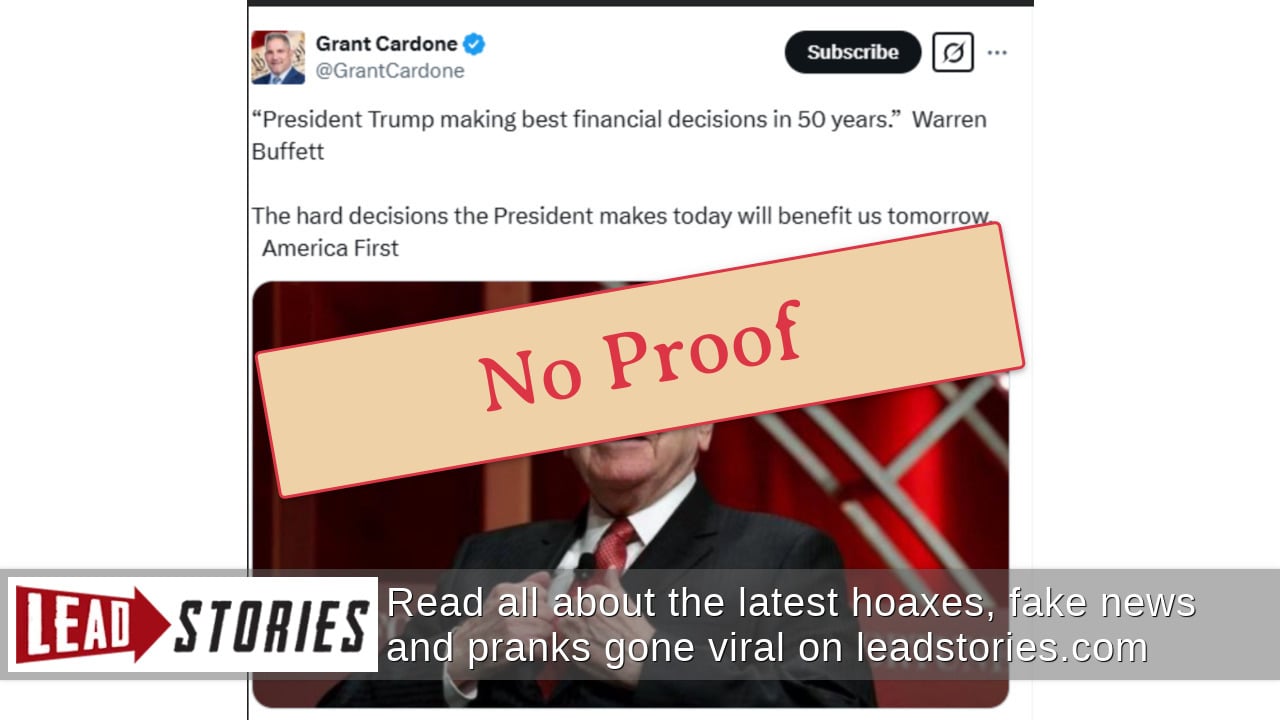False Reports: Warren Buffett Denies Supporting Trump's Tariffs

Table of Contents
The Origin and Spread of the False Reports
The false reports claiming Warren Buffett's support for Trump's tariffs originated from a confluence of sources, primarily social media and unreliable news websites. These sources employed various methods to spread misinformation, including manipulated images, fabricated quotes, and misleading headlines designed to grab attention and generate clicks. The lack of fact-checking and the rapid spread through social media algorithms amplified these false narratives.
- Example 1: A viral Facebook post featured a manipulated image of Warren Buffett seemingly endorsing Trump's trade policies.
- Example 2: A screenshot circulating on Twitter showed a fabricated quote attributed to Buffett praising the tariffs' impact on the American economy.
- Example 3: Several websites known for publishing unsubstantiated and often false news stories promoted the narrative of Buffett's supposed support for the tariffs.
Warren Buffett's Actual Stance on Trump's Tariffs
Contrary to the false reports, Warren Buffett has never publicly endorsed Donald Trump's tariffs. His actual stance has consistently reflected concerns about their potential negative consequences for the American economy. While he hasn't explicitly stated blanket opposition to all tariffs, his public statements and actions indicate a preference for free trade and a critical view of protectionist policies.
- Specific quote from an interview: While a direct quote explicitly opposing all Trump tariffs is difficult to pinpoint due to the nuanced nature of his commentary, Buffett has repeatedly stressed the importance of free trade and warned of the potential negative consequences of protectionist measures, often citing the potential for retaliatory tariffs and harm to American businesses.
- Reference to a relevant article or news report: News articles covering Buffett's public appearances and interviews consistently portray a cautious, if not critical, perspective on Trump’s trade policies. Analyzing his investment decisions during that period also provides supporting evidence.
- Summary of his arguments: Buffett's arguments largely revolve around the potential for reduced global trade, increased prices for consumers, and harm to American businesses operating internationally. He consistently champions a more balanced and open approach to global trade.
The Impact of False Reports
The consequences of spreading misinformation about Warren Buffett's stance on Trump's tariffs are significant. Such false narratives can sway public opinion, influence policy discussions, and distort public understanding of complex economic issues.
- Potential impact on investor confidence: False reports questioning Buffett's views can undermine investor confidence, especially given his immense influence and reputation in the financial world.
- Influence on political discourse: The spread of misinformation can fuel divisive political rhetoric and complicate rational debate on important economic policies.
- Distortion of public understanding of economic issues: Believing false information can lead to a misunderstanding of the intricacies of trade policy and its impacts on the economy.
Combating Misinformation
To avoid falling prey to false reports, it's crucial to cultivate critical thinking skills and media literacy. Always verify information from multiple reputable sources before accepting it as fact.
- Tips for fact-checking online articles: Check the website's reputation, look for evidence of bias, and cross-reference information with established news organizations and fact-checking websites.
- List of reputable news sources: Examples include the Associated Press, Reuters, Bloomberg, and The Wall Street Journal.
- Importance of cross-referencing information from multiple sources: Never rely on a single source; comparing information from diverse sources helps identify inaccuracies and biases.
Separating Fact from Fiction: The Truth About Warren Buffett and Trump's Tariffs
In conclusion, the reports claiming Warren Buffett supported Trump's tariffs are demonstrably false. His actual stance reflects a cautious and generally critical perspective on protectionist trade policies. The spread of misinformation highlights the critical need for responsible reporting and media literacy. We must all become more discerning consumers of information, actively fact-checking claims and using reliable sources to verify information before sharing it. Let's work together to combat the spread of false reports about Warren Buffett and other public figures, ensuring informed and accurate discussions on critical economic and trade policies. By practicing diligent fact-checking and utilizing reliable sources, we can collectively strive towards avoiding false reports and promoting responsible information sharing.

Featured Posts
-
 Will The Wbo Order Usyk Vs Dubois Joe Parkers Mandatory Claim Explained
May 05, 2025
Will The Wbo Order Usyk Vs Dubois Joe Parkers Mandatory Claim Explained
May 05, 2025 -
 Is Darjeeling Tea Production In Crisis Examining Current Concerns
May 05, 2025
Is Darjeeling Tea Production In Crisis Examining Current Concerns
May 05, 2025 -
 Powerful Art Exhibition Launches In Athy A Whats On Guide
May 05, 2025
Powerful Art Exhibition Launches In Athy A Whats On Guide
May 05, 2025 -
 Bradley Cooper And Lea De Seine Shayk Cooper Super Bowl 2025 Green Jacket Twins
May 05, 2025
Bradley Cooper And Lea De Seine Shayk Cooper Super Bowl 2025 Green Jacket Twins
May 05, 2025 -
 Post Parker Knockout Ibfs Decision Impacts Bakole And The Significance Of The Ajagba Fight
May 05, 2025
Post Parker Knockout Ibfs Decision Impacts Bakole And The Significance Of The Ajagba Fight
May 05, 2025
